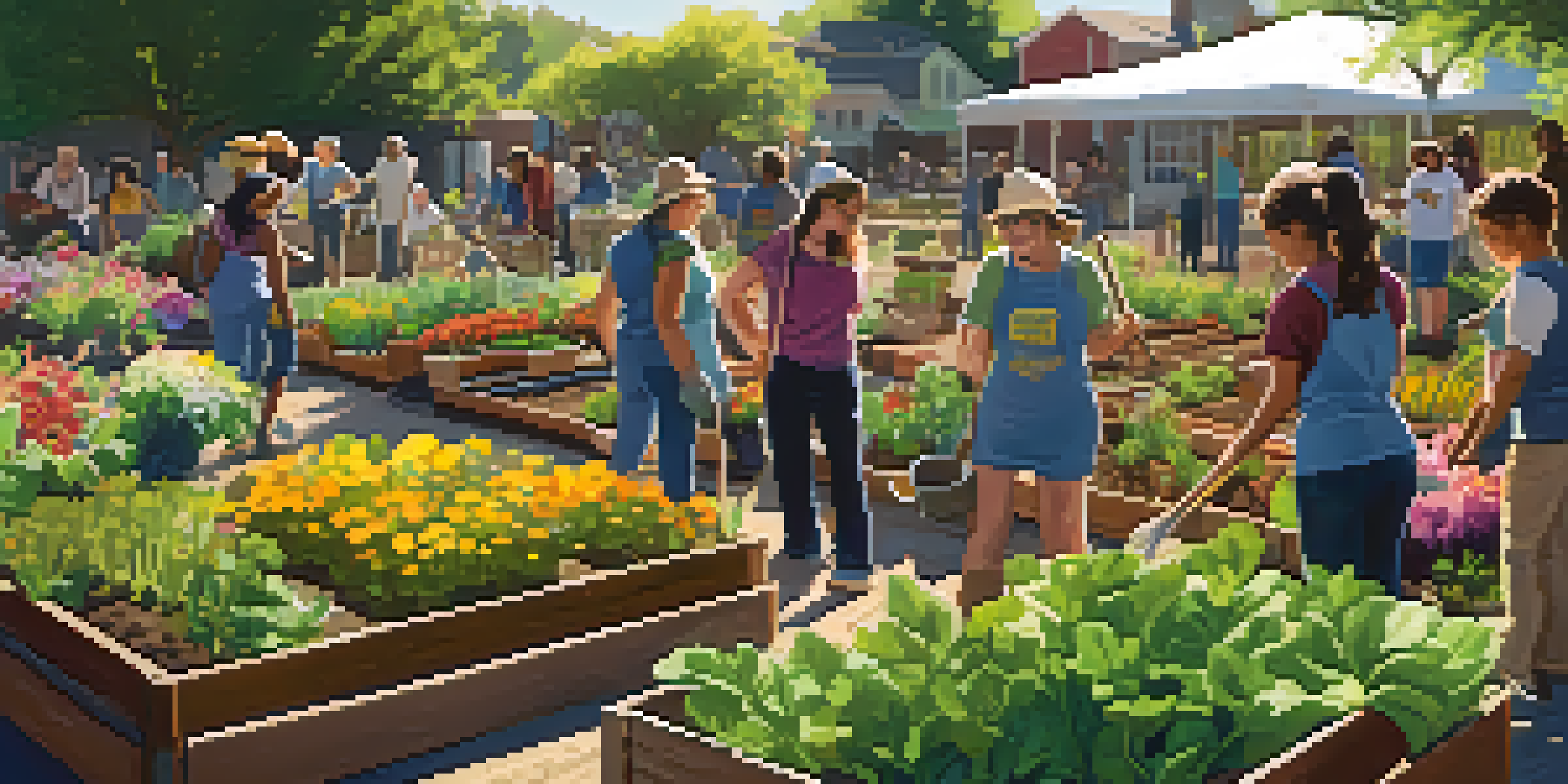Community Engagement Through Volunteer Programs in Gardens

The Importance of Community Engagement in Gardening
Community engagement in gardening is essential for fostering relationships and building a sense of belonging. When individuals come together to cultivate a garden, they share not only the soil but also their stories, skills, and cultures. This collaboration transforms a simple garden into a vibrant space that reflects the community's diversity and unity.
The best time to plant a tree was twenty years ago. The second best time is now.
Moreover, gardening offers a unique platform for people of all ages to engage in meaningful activities. Whether it's planting seeds, watering plants, or harvesting fruits and vegetables, participants learn valuable skills while also nurturing their environment. This hands-on experience encourages teamwork and strengthens community bonds.
As gardens flourish, so does the sense of pride among volunteers. Seeing the fruits of their labor—literally—can ignite a passion for sustainability and environmental stewardship. When people invest time and energy into their community gardens, they're more likely to care about their neighborhood and advocate for its well-being.
Benefits of Volunteer Programs in Gardens
Volunteer programs in gardens provide a wealth of benefits that extend beyond just the greenery. Firstly, they promote physical health by encouraging volunteers to engage in outdoor activities that involve walking, digging, and planting. Regular physical activity can lead to improved fitness levels, which is a win-win for both individuals and the community at large.

Additionally, these programs can enhance mental health by offering a therapeutic outlet. Gardening has been shown to reduce stress and anxiety, allowing volunteers to escape the hustle and bustle of daily life. The act of nurturing plants can lead to a sense of accomplishment and well-being, making it a perfect remedy for modern-day stresses.
Community Gardens Foster Connections
Gardening brings people together, creating friendships and a sense of belonging within the community.
Lastly, volunteer garden programs often contribute to food security by providing fresh produce to local communities. This not only helps those in need but also educates individuals about healthy eating and sustainable practices. By growing their own food, community members can take control of their nutrition while nurturing their relationship with the environment.
Creating Inclusive Volunteer Opportunities
To maximize the impact of volunteer programs in gardens, it's crucial to create inclusive opportunities that welcome everyone. This means considering the diverse backgrounds, abilities, and interests of community members. By offering a variety of roles, such as planting, organizing events, or teaching workshops, more people can find a way to contribute.
Gardening adds years to your life and life to your years.
Moreover, accessibility is a vital component of inclusivity. Ensuring that gardens are physically accessible to all—regardless of mobility challenges—can open doors for participation. For example, raised garden beds can make it easier for individuals in wheelchairs to engage in gardening activities.
Lastly, fostering a welcoming environment where everyone feels valued is key to successful volunteer programs. Regular feedback sessions and open discussions can help maintain a sense of belonging, making volunteers feel like integral parts of the garden community. When people feel heard and included, they're more likely to remain engaged and committed.
Building Skills Through Gardening
Volunteer programs in gardens serve as excellent opportunities for skill-building. Participants can learn a variety of gardening techniques, from planting and pruning to pest management and crop rotation. These skills not only contribute to the garden's success but also empower individuals to cultivate their own gardens at home.
In addition to gardening skills, volunteers often gain valuable organizational and leadership abilities. Those who take on roles such as coordinators or event planners can learn how to manage projects, communicate effectively, and work collaboratively with others. These are essential skills that can be applied in various aspects of life, from personal relationships to professional environments.
Volunteering Enhances Well-Being
Participating in garden volunteer programs promotes physical and mental health while fostering a sense of accomplishment.
Furthermore, educational workshops can be an integral part of volunteer programs, offering specialized knowledge on topics like composting, organic gardening, or pollinator conservation. These learning experiences enrich participants' understanding of the ecosystem and promote environmentally responsible practices. As volunteers become more knowledgeable, they can inspire others to join the gardening movement.
Creating Lasting Connections Through Gardening
Gardening can be a powerful tool for creating lasting connections within communities. As volunteers work alongside one another, they often develop friendships that extend beyond the garden. Shared experiences—whether it's a successful harvest or a challenging day—can forge bonds that strengthen the fabric of the community.
Community gardens can also serve as gathering spaces for events, fostering a sense of camaraderie. From potlucks to seasonal festivals, these gatherings allow volunteers to celebrate their hard work and accomplishments. Building these memories together can enhance community spirit and encourage ongoing participation.
Moreover, the connections made through gardening can lead to broader collaborations. Volunteers may find inspiration to embark on new projects, such as neighborhood clean-ups or educational initiatives. These partnerships can further enrich the community and demonstrate the power of working together towards a common goal.
The Role of Local Organizations in Volunteer Programs
Local organizations play a crucial role in facilitating volunteer programs in gardens. By providing resources, guidance, and support, these groups can help ensure that programs are well-organized and impactful. They can connect volunteers with training opportunities and provide access to materials such as seeds, tools, and educational resources.
Additionally, these organizations often serve as liaisons between volunteers and the community. They can help identify local needs and tailor gardening initiatives accordingly, ensuring that the programs are relevant and beneficial. This collaborative approach fosters a sense of ownership and pride among community members.
Inclusive Opportunities Boost Engagement
Creating diverse and accessible volunteer roles ensures that all community members feel valued and can contribute.
Furthermore, local organizations can assist in promoting volunteer programs, attracting a diverse group of participants. By leveraging social media, newsletters, and community events, they can spread the word about the positive impact of gardening. Increased visibility can lead to higher engagement and ultimately, a more vibrant community garden.
Measuring the Impact of Volunteer Gardening Programs
Evaluating the impact of volunteer gardening programs is essential for understanding their effectiveness and areas for improvement. Metrics such as volunteer participation rates, produce yield, and community engagement can provide valuable insights. These assessments help organizers appreciate what’s working and identify opportunities for growth.
Qualitative feedback from volunteers can be particularly enlightening. Gathering testimonials and stories can showcase the personal transformations that occur through participation, highlighting the emotional and social benefits of gardening. This narrative approach can inspire new volunteers and attract support from local organizations or funders.

Lastly, sharing the results of these evaluations with the broader community can foster transparency and encourage ongoing involvement. When community members see the tangible outcomes of their efforts, they are more likely to stay engaged and promote the program to others. Measuring impact not only informs future practices but also celebrates the achievements of the gardening community.